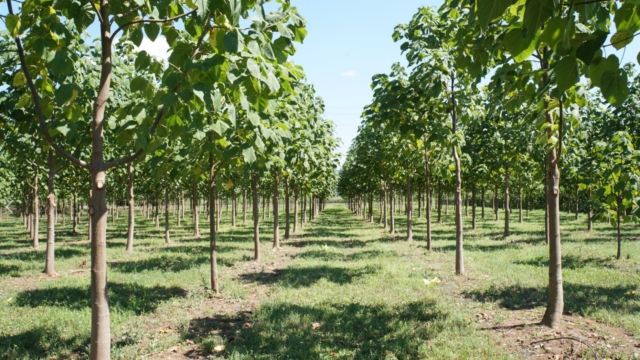Climate change: Forestry Commission approves plantations of carbon-sucking tree species
It will be the first time hybrid Paulownia trees – which can absorb 10 times as much carbon as native forests – will be planted in Britain

Trees imported from Asia for their carbon-sucking potential are set to be planted across Norfolk and Suffolk after a pioneering project won permission from the Forestry Commission last week.
Carbon Plantations plans to introduce hybrid Paulownia trees to 468 hectares of land, the first time the species will have ever been planted in the UK.
Paulownia trees are widespread in Asia. The species is thought to be one of the fastest-growing in the world, reaching up to eight metres tall in only five years.
Carbon Plantations says this makes them an effective carbon absorber, able to capture up to 10 times as much carbon dioxide compared to native woodland, and aiding the battle against climate change.
Planting will begin in May next year, across four sites which are mainly agricultural land that has been intensively farmed. Carbon Plantations said the new woodland would help to restore soil structure, reduce flooding, and provide timber.
“No other tree can sequester as much CO2 as quickly as the Paulownia, and its wood is known as the aluminium of the timber industry,” said Nigel Couch, the company’s chairman.
“These first four plantations alone are expected to sequester over 1.5 million tonnes of CO2 in their lifetime – it’s a win-win for the climate and for farmers.”
The hybrid variety that will be planted in England has been bred for northern climates and is infertile so is less likely to become an invasive species, Carbon Plantations says.
However, conservationists are wary, warning that new woodland should be designed to boost native wildlife, not just to store carbon.
“It strikes me as a wasted opportunity,” wildlife expert and TV presenter Chris Packham told i. “We should be planting native trees to lock up that carbon, to make the landscape more resilient, hold water up, but also increase biodiversity.”
Carbon Plantations said its projects would also improve biodiversity, pointing out that 15 per cent of all four plantations will be planted with native woodland.
From inews.co.uk
